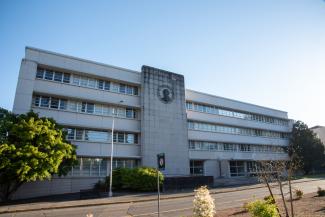SEPA Environmental Review
SEPA overview
The State Environmental Policy Act (SEPA) process analyzes potential environmental impacts of development proposals and policies, like construction projects and comprehensive plans.
The SEPA review can be used to deny or modify a proposal to avoid, reduce, or compensate for impacts. More information about the SEPA process can be found on the Washington State Department of Ecology website.
Current SEPA reviews
No reviews at this time.
Recent SEPA reviews
The public comment periods for the following projects are complete.
- General Administration Building Demolition
-

During the 2023 legislative session, the Legislature directed DES to develop plans to demolish the General Administration building, located at 210 11th Avenue SW on the West Capitol Campus.
The six-story building has been unoccupied since 2018. Its wiring, plumbing, and structural elements no longer meet current building code, and entry is hazardous to human health.
Following a public comment period, DES issued the following Notice of Action Taken describing its decision to proceed with demolition.
Documents:
- Aug. 12, 2024: Threshold determination of non-significance
- Aug. 12, 2024: SEPA checklist
- Oct. 30, 2024: Notice of Action Taken
- Oct. 30, 2024: Public Comments and Responses
- Supporting document: Historical Artifact Assessment & Treatment
- Supporting document: Cultural Resources Assessment
- Supporting document: Hazardous Building Materials Survey Report
- Capitol Campus Buildings and Grounds Facility
-
DES will replace an aged shed and storage container with a 4,900 square foot maintenance facility, and improve nearby underground utilities and landscaping.
Documents:
- May 17, 2024: SEPA Environmental Checklist
- June 6, 2024: SEPA Threshold Determination of Non-Significance
- Joel Pritchard State Library Rehabilitation and Expansion Project
-
The public comment period for this project closed on June 12. DES posted responses and a Notice of Action Taken on Sept. 19.
The Joel Pritchard State Library Rehabilitation and Expansion Project, part of Legislative Campus Modernization, will rehabilitate and expand the existing Joel Pritchard State Library used primarily by the House of Representatives to address serious life-safety issues, update outdated building systems, and address business needs.
Documents:
- May 26, 2023: SEPA checklist
- May 26, 2023: Threshold determination of non-significance
- Sept. 19, 2023: Notice of Action Taken
- Sept. 19, 2023: Joel Pritchard State Library Expansion and Rehabilitation Project comments and LCM responses
- Supporting documentation
- Capitol Campus Wedge Barrier
-
The Capitol Campus Wedge Barrier project is designed to construct security vehicle barriers at two locations at the West Capitol Campus, including warning signals, detour signage, and security cameras.
Documents:
- January 2022: SEPA Checklist
- Sept. 1, 2022: Threshold Determination
- Oct. 18, 2022: Notice of Action Taken
- Capitol Lake/Deschutes Estuary Long-Term Management Environmental Impact Statement
-
The Capitol Lake/Deschutes Estuary Long-Term Management environmental review, called an environmental impact statement, studied three options for the long-term management of Capitol Lake to identify and implement a sustainable plan to improve water quality, manage existing and future sediment in the waterbody, improve ecological functions and improve community use.
In October 2022, DES named the Estuary Restoration as the preferred alternative to best achieve project goals, have broadest stakeholder support, and supply other benefits to the natural and built environment. Implementation is dependent on Legislative funding.
See all SEPA documents in the Capitol Lake—Deschutes Estuary document library.
- Legislative Campus Modernization
-
Major construction campaign to address serious life-safety issues and outdated building systems on part of the historic West Capitol Campus through 2028. The project will replace the existing Irv Newhouse building, expand and rehabilitate the Joel Pritchard State Library, and renovate a portion of the John L. O’Brien Building.
Four SEPA reviews are needed for LCM – Global/Non-Project, Modular Building, Newhouse Replacement Project, and the Joel Pritchard State Library Rehabilitation Project.
View the complete LCM SEPA checklist supporting documentation.
Global/Non-Project Review
Evaluated overall impacts of the LCM project.
Documents:
- May 2022: SEPA checklist
- Aug. 19, 2022: Threshold determination
- Jan. 3, 2023: Notice of action taken
- Comments and DES responses
- Supporting documentation
Modular Building
Focused on the impacts of constructing a temporary modular building on the Capitol Campus to serve as swing space for displaced building occupants during project construction.
Documents:
- June 2022: SEPA checklist
- Aug. 8, 2022: Threshold determination
- Oct. 7, 2022: Notice of action taken
- Comments and DES responses
- Supporting documentation
Newhouse Replacement Project
Focused on the impacts of replacing the existing Irv Newhouse Building, which included the removal of the obsolete Capitol Press Corps Houses.
Documents:
- June 2022: SEPA Checklist
- Aug. 19, 2022: Threshold determination
- Jan. 3, 2023: Notice of action taken
- Comments and DES responses
- Supporting documentation
SEPA public review process
SEPA Checklist
After identifying that a project needs to go through the SEPA process, the project team will send a SEPA checklist and supporting documents to the Department of Ecology.
Environmental review and threshold determination
The designated DES SEPA official has 90 days to complete an environmental review and issue a threshold determination deciding whether a project can move on, or if significant environmental impacts remain.
Public comment period
The public generally has a minimum of 14 days to comment on the threshold determination.
Final threshold determination
DES will review all public comments and then file a final threshold determination. If the project has no significant impacts, either with or without tactics to reduce or offset those impacts, it can move forward, and the environmental review is complete.
If there are still significant impacts, the project team may need to perform a more detailed environmental review. Or, the project could be denied.
Appeal
Interested parties can appeal the final SEPA threshold determination, within a set timeframe that is listed in the determination.